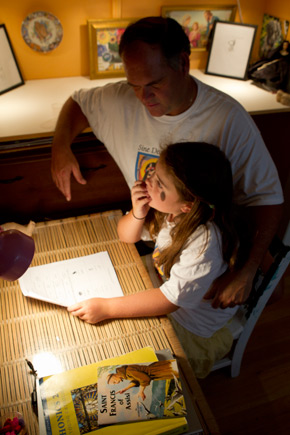WASHINGTON (CNS) — Although Catholic home-schooled students do not necessarily start the school year with new friends, teachers or schedules, they often have their own ways of bringing in the new school year.

The Leone family in Madison, Wis., celebrates with a Mass and picnic organized by a support group of Catholic home educators in the Diocese of Madison.
Ordering new books and organizing the classroom is also a back-to-school tradition, said Elizabeth Leone, a mother of seven who home-schools her children.
In San Antonio, the Davis family has a retreat to start the school year. Shelley Davis, mother of four, described the retreat as a time to “collect ourselves spiritually and academically.
Meghan Hackett, a former teacher who lives in Highland, Md., who home-schools her two daughters, Emma, 16 and Kathleen, 8, begins the school year with by attending Mass with other home-schooling families.
She told Catholic News Service that some families start the school year with pilgrimages and others with devotions to Mary Sept. 8, the feast of the Nativity of the Blessed Virgin Mary.
For some home-schooling families, there isn't a clear distinction of when school is “closed” for the summer and when it “re-opens.”
That's because some families opt to continue teaching during the summer — usually with a lighter workload — so they don't lose momentum.
“We try to end (the school year) when we are done,” said Hanna Muldowney, a former public school teacher in Texas, who now educates her six children.
She also said the school year could extend to make sure all the subjects are covered or to accommodate family occasions, such as the birth of her baby, due in December. She said the family will likely take time off then, because they only had month of school vacation this summer.
Starting the school year earlier than local public and Catholic schools allows them to take longer Christmas breaks and to take breaks when relatives come to visit, which enables them to separate school time from family time, she said.
According to the National Home Education Network in Austin, Texas, 1.5 million to 2 million students are home-schooled in the U.S., which accounts for 3 to 4 percent of the school-age population.
Parents often make the decision to teach their children at home to offer better academic opportunities to their children, but the reasons to do so have increased over with the years, said Leone.
The Wisconsin mother said there have been many factors that have made home schooling work for her family. She likes how it has united her family, given her flexibility and the chance to tailor the curriculum based on the children's needs. It also has provided the chance to incorporate faith in learning, she added.
Hackett in Maryland similarly likes the way home schooling provides opportunities to teach the faith.
“Home schooling is the road less traveled but the reward is the outcome,” she told CNS. “My children are growing to have an authentic love for God and for their faith.”
— By Maria Pia Negro, Catholic News Service





